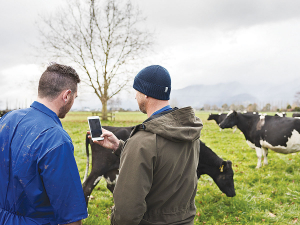Come and chat to the DairyNZ team
DairyNZ's team is looking forward to catching up with Southland and Otago dairy farmers at the Southern Field Days in Waimumu near Gore next month.
 Go Dairy is a $3.5 million campaign being run by DairyNZ to try and get 1000 kiwis to fill dairy farm jobs.
Go Dairy is a $3.5 million campaign being run by DairyNZ to try and get 1000 kiwis to fill dairy farm jobs.
DairyNZ says some of the people who have completed their training programme, Go Dairy, are already working on dairy farms.
People Team Leader Jane Muir says she’s excited at what has happened in just a few weeks since the programme has been running.
Go Dairy is a $3.5 million campaign being run by DairyNZ to try and get 1000 kiwis to fill dairy farm jobs. It is targeting NZ residents or citizens of all ages who have either lost their jobs due to Covid-19 or think they might or are looking for a new career path.
The programme consists of a 10 hour online introductory course followed by a two week practical course with a focus on handling farm machines and also how to manage animals. The aim is to make participants ‘farm ready’ and to give them the necessary skills to apply for a farm assistant job on a dairy farm.
Muir says so far about 150 people have completed the online course and some of these people have already got jobs on dairy farms, such is the demand for staff.
“Employers are saying they really want access to those people who have done farm-ready training. They are showing they are open to employing people who are making a career change and clearly value the ‘fit for purpose training’ which we are offering,” she says.
Muir says some of those already with jobs on farms haven’t completed the practical part of the programme but she says this is mainly due to farmers wanting staff to help with calving. She says it’s likely they will train at some stage in the future.
She says another reason is that DairyNZ needs to get a reasonable sized group together in a given area to make it worthwhile to deliver the practical training.
Muir says one of the aims of the GoDairy programme is to show the New Zealand public that there are good jobs in the dairy industry, and given the interest to date, this has certainly been the case.
The success of the GoDairy programme comes in the same week the Government launched the ‘Opportunity Grows Here’, a generic campaign aimed at showcasing employment opportunities right across the primary sector. A special website has been set up which shows the variety of jobs available and enables people to link to specific sectors that interest them.
Agriculture Minister Damien O’Connor says people can often find it hard to get information about a job, so the new website brings opportunities from across the primary sector together into the one place, making it easier for employers and for job seekers.
“Many unemployed people are talented and have skills that are readily transferrable. They just need to know that these opportunities exist – that’s what this campaign is all about. The research we did showed us that people didn’t know about the range of job options in the sector or that they might have the right skills,” he says.
O’Connor says job opportunities aren’t just in remote, labour-based roles. He says some are in our cities and include work in science, technology, business management, marketing and research.
Buying or building a rural or semi-rural property? Make sure you know where the wastewater goes, says Environment Canterbury.
With collars on more than seven million cows worldwide, Nedap says its standalone launch into New Zealand represents world-leading, reliable and proven smart technology solutions for dairy farmers.
The Meat Industry Association (MIA) is once again looking for game-changing ideas for New Zealand's red meat processing and exporting sector.
Environment Southland is inviting feedback on two bylaws that play a critical role in safeguarding the region's waterways and ensuring the safety of the local community.
While the North Island is inundated with rain, Southland is facing receding water levels as warm weather and lack of rainfall continues.
Entries have opened for the 2026 Fieldays Innovation Awards.
OPINION: There will be no cows at Europe's largest agricultural show in Paris this year for the first time ever…
OPINION: Canterbury grows most of the country's wheat, barley and oat crops. But persistently low wheat prices, coupled with a…